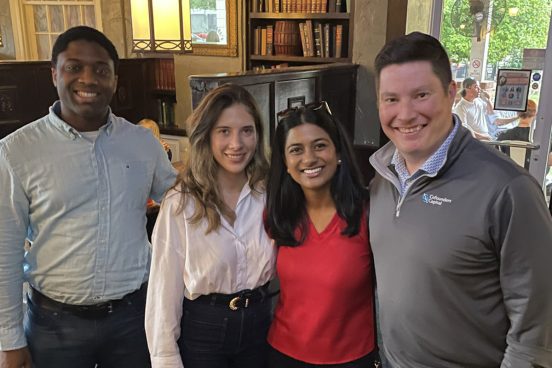Duke Daytime MBA Student Blog

My Entrepreneurial Hustle
In those interactions, I made the decision to engage in entrepreneurship—the ultimate hustle.

As a young child in Ghana, I became acutely aware of what it meant to have a ‘hustle.’ I do not mean hustle in the traditional sense seen in American movies. What I mean is hustling within a system—a framework that enables individuals to use the resources available to them. I saw hustlers among young mothers in Ghana, who sold fruits at the evening markets. I saw hustlers among students, who tutored other students for extra cash. This Ghanaian hustle mentality instilled in me a desire to better engage with my available resources.
Getting My Start
After diligently working within the frameworks available to me as an undergraduate college student, I became aware of the resources in various avenues, particularly among my peers. I saw that working with my classmates would allow me to engage these resources and grow the ideas I had at such a young age. In those interactions, I made the decision to engage in entrepreneurship—the ultimate hustle. I became invested in working with my Ghanaian peers to start companies. I started my first company, Unit Alliance, with my college friends.
Companies Number 2 and 3
After three years working in the financial sector and consulting, I cofounded Procap with one of my best friends. This investment company was the first that fully shaped my understanding of finance. It allowed me to engage fruitfully in the notions that had once seemed theoretical in classrooms. Through this company, I developed more love for entrepreneurship. I understood what it meant to take credibility and accountability for a hustle I had created.
The second company I cofounded with the same friend was Oyster Agribusiness, raising more than $2.3 million to support 2,500-plus smallholder farmers to double their income. Initially, I knew very little about this avenue until I began understanding the market for this type of company in Ghana. Agriculture was and still is an incredibly important sector of the Ghanaian economy. In working with Oyster Agribusiness, I better understood what it meant to fill a need within my community.
Fuqua Ties it All Together
My experiences with these two companies forced me to seek greater knowledge—knowledge that I would gain from completing an MBA degree from Duke University. Soon, I found myself living in Durham, North Carolina. In this area, I found similarities in the Ghanaian environment I had grown up in. Yet, I also found stark differences. While adapting to my new life in Durham, I noticed a difference that would change my perception of individuals’ lifestyles; that difference was rent. How was it possible that I could pay rent monthly here while I had to pay a bulk sum in Ghana? Engaging with these differences allowed me to start my ultimate entrepreneurial hustle—Renmo.
Renmo, a credit assessment company that seeks to provide tenants with monthly rent options, became my brainchild. Suddenly, I saw that my time at Duke and my time in Durham had provided me with an incredibly valuable resource—information—and that this information could change the landscape of rent in Ghana.
Today, I am working on Renmo and using the skills learned through my experience as a Ghanaian, the skills learned through my previous entrepreneurial endeavors, and the skills provided to me by the Duke MBA program—especially the opportunity to fine-tune Renmo with my team in the classroom.
I completed my MBA with more confidence in my entrepreneurial pursuit because of the training I have received from Fuqua’s Center for Entrepreneurship and Innovation. And the hustle continues!



